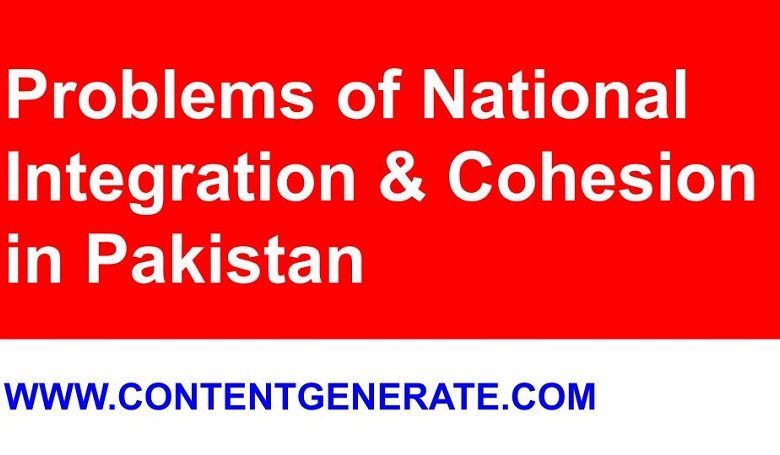Problems of National Integration and Cohesion

This article analyzes problems associated with building national cohesion and integration in Pakistan.
Contents
Introduction
National integration has remained an issue in almost all post-colonial countries including Pakistan. (Hashmi 2014). Unlike the developed world, the under-developed nations do not adopt planned policies and strategies acceptable to all ethnic, lingual, sectarian, or racial groups. (Tabbasum 2020). As far as Pakistan is concerned, it is facing challenges associated with national integration because of a multitude of reasons, e.g. the mishandling of the conflicting nature of the socio-political fiber of the society. (Hashmi 2014).
What are the problems associated with national Integration and cohesion in Pakistan?
Problems associated with national integration and cohesion are as follows:
1. Strong and authoritative central government
Hashmi (2014) notes the state has adopted an authoritarian approach to consolidate its power and position in Pakistan. This authoritarian policy created insecurity among different ethnic groups with regard to their separate identity. In a bid to counter the insecurity, ethnic movements came to the surface at times challenging the national integration in Pakistan.
2. Assimilationist strategy of the state
Hashmi (2014) notes that in order to promote national integration a state should adopt a pluralistic approach rather than an assimilationist strategy. Unfortunately, in Pakistan, the state has adopted an assimilationist strategy for the last many decades. National unity, security, and integrity will be achieved if the primary emphasis is placed on promoting equity and harmony rather than on the suppression of ethnic differences in the name of national unity. (Ahmed 1996).
3. Sub Nationalist Tendencies
Oppressed nationalities, neglected regions, parochial political interests, and weak governance have given rise to sub-nationalism and a militant culture threatening the national integration process in the country. (Shah & Ishaque 2017). The federation has failed to address issues related to language and provincial status setting stage or sub-nationalism in Pakistan. In due course, subjecting nationalities to oppression and provinces to neglect have given birth to a number of sun nationalist movements.
4. Un-even economic development
Balochistan, Tribal Areas, Gilgit-Baltistan are the poorest regions in Pakistan. These areas are characterized by under-developed infrastructure, lack of economic opportunities, and extreme poverty. The lethargic attitude of the successive regimes towards these areas has led to disenchantment among the local people thus giving rise to militancy. Thus the uneven development and inequitable distribution have serious consequences and repercussions affecting national integration in Pakistan.
5. Religious intolerance and terrorism
Pakistan’s role in the Afghan-led polarization on religious and sectarian lines. Shah & Ishaque (2017) note, the religious mindset prepared during Afghan Jihad worked well when it came to fighting the Russians but it had severe consequences on Pakistan. For instance, the Madrasa education in Pakistan aimed at building an anti-Russia rhetoric also sowed seeds of conflict among different sects.
In Pakistan dozens of religious groups exist with divergent interpretations of religion. Each group insisted on the validity of only their respective religious understanding. As a result, the menace of religious intolerance and terrorism crept into the society creating internal dissensions and weakening the very fabric of society.
References
1. Hashmi, D., & Saeed, R. (2020). Ethnic politics: An issue to National integration (The case of Pakistan). South Asian Studies, 29(1).
2. Tabassum, S., & Bhatti, G. M. D. M. N. (2020). Issues of National Integration in Pakistan with Reference to Balochistan. Pakistan Social Sciences Review, 4(1), 204-215.
3. Ahmed, F. (1996). Pakistan: ethnic fragmentation or national integration?. The Pakistan Development Review, 631-645.
4. Shah, S. J., & Ishaque, W. (2017). Challenges of national integration in Pakistan and strategic response. ISSRA PAPERS, 9(2), 35-48.




